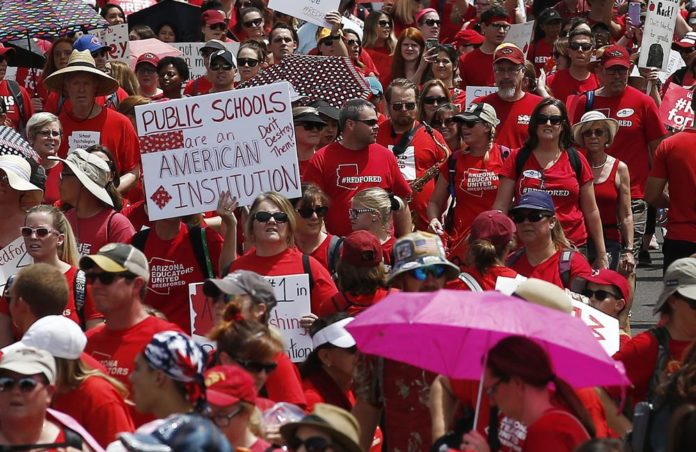
A program announced by Arizona’s Republican governor last month to give private school vouchers to parents who object to campus mask requirements has seen applications surge, with twice as many either started or completed than can be funded with the $10 million in federal coronavirus relief earmarked for the plan.
And Republican lawmakers who back an expansion of the state’s existing voucher program doubt any students who receive the grants will be forced back into public schools when the federal cash is exhausted. Opponents of the school voucher program suspect that it is highly likely.
The program Gov. Doug Ducey created will give $7,000 per school year to each student who enrolled in a public school with either mask requirements or that requires unvaccinated children exposed to the virus to quarantine or isolate differently than vaccinated children. Applicants can earn up to 350% of the federal poverty level, which equals $92,750 for a family of four. They can use the money for private school tuition, tutoring, or other costs.
The governor’s education policy adviser said last week that applications for 454 children had been completed, and another 2,255 started in the first 13 days the application window was open, and 69 approved.
If all the current applications are completed and funded, the governor would need to pump another $10 million into the program, and would consider doing so, said Kaitlin Harrier, the education policy adviser.
“It’s important that we, at every step, no matter what’s happening, no matter what stage of the pandemic we’re in, we give parents options,” Harrier said.
The program uses some of the federal pandemic school funding directly controlled by Ducey, who signed legislation banning masks or vaccine mandates in schools in June that takes effect on Sept. 29.
Opponents of vaccines and masks, including several Republicans vying to replace Ducey in 2022 when he must leave office, called for a new voucher program after some schools kept mask mandates in place despite the new law amid a statewide surge in COVID-19 cases. They were inspired by a similar push by GOP Florida Gov. Ron DeSantis to give vouchers to students whose parents oppose school mask mandates.
Ducey is a major supporter of “school choice” — a blanket term for allowing parents to use money that would normally go to their public school for private school tuition or other education costs. He has continued supporting voucher expansions despite voters soundly rejecting a 2017 universal school voucher law by a 2 to 1 vote the following year. Arizona voters can temporarily block laws enacted by the Legislature by gathering signatures, and if voters ultimately oppose the measure, it is repealed.
Ducey and Republicans who back school vouchers have continued to expand the voucher program, although another major expansion this year was sharply scaled backed amid opposition from a handful of Arizona House Republicans.
Sharon Kirsch, spokeswoman for the grassroots group of educators and parents that organized the referendum, Save Our Schools Arizona, said she is curious what kind of outreach the governor has done to promote the programs and just who is applying.
“Of course we have concerns, of course, we know that this will be a permanent expansion,” Kirsch said Friday. “They continue to try to find ways to expand — they’re relentless about that.”
The governor’s office was unable to immediately provide any breakdown on the applicants, either their demographics or where they live.
Republican Rep. John Kavanagh, who chairs the House appropriations committee and, like many in his caucus backs school vouchers, said he hopes those awarded grants will never be forced back into a public school.
“I would hope that we would use state money and that we could let them remain in the schools that they’ve migrated to,” Kavanagh said. “I don’t think people would be upset if we don’t rip kids out of the new schools that they’ve been attending.”
Before this year’s scaled-back expansion, the Arizona Department of Education says about 250,000 students were eligible, but only about 10,000 students are getting vouchers, technically called Empowerment Scholarship Accounts. They cost the state about $145 million a year. More than half goes to disabled students, the original group intended to benefit from the program when it was created in 2011.
The governor’s office said the new program will help parents who object to COVID-19 restrictions imposed by schools during and after the pandemic.
“It’s certainly my hope that parents will have options, no matter where their home school is and regardless of this program,” Harrier said. “And that we would have a school choice environment that would transcend above all of this and provide maximum choice.”
Republished with the permission of the Associated Press.














